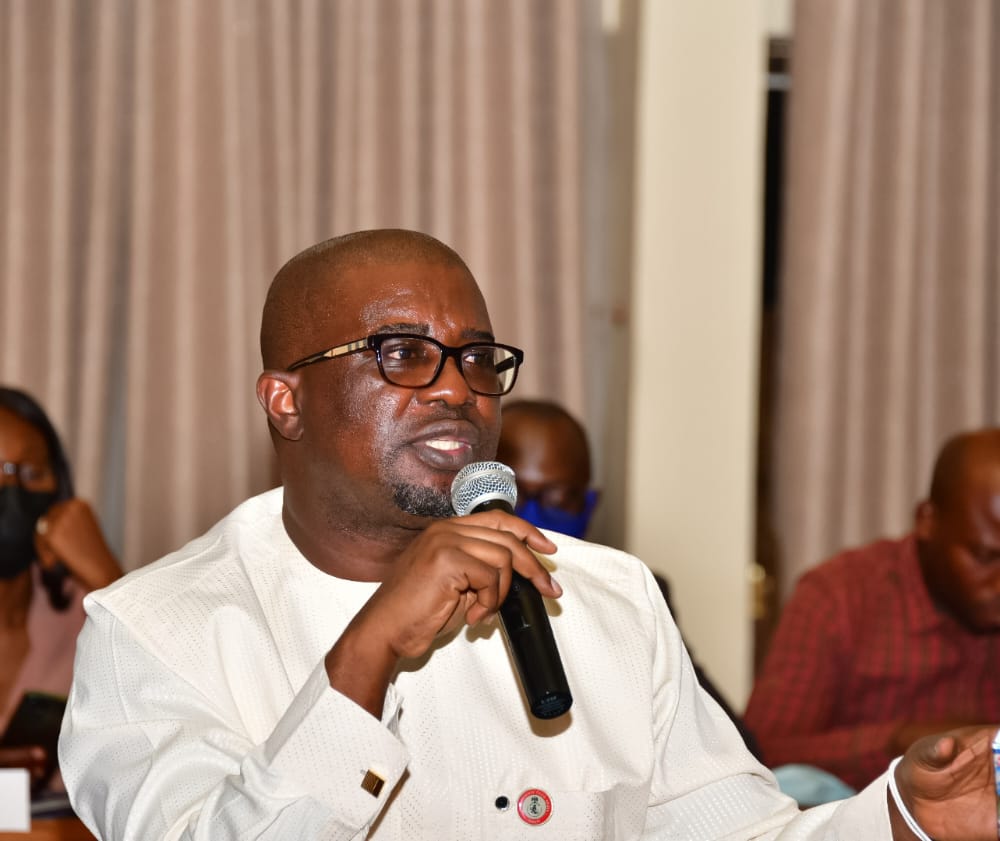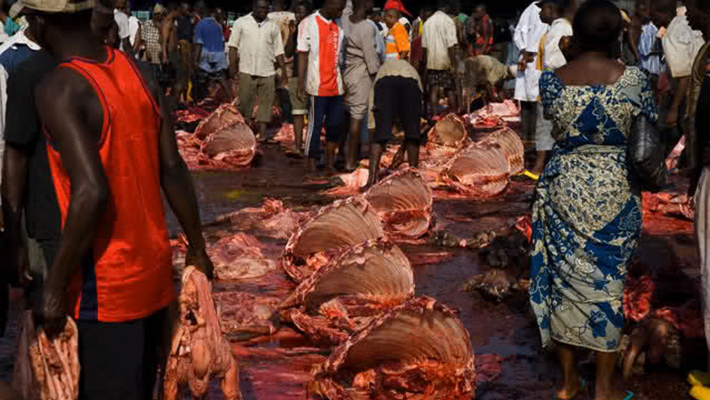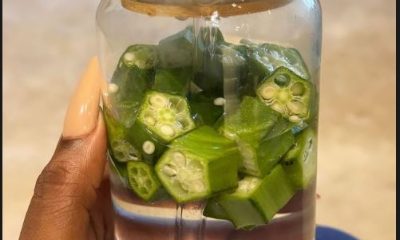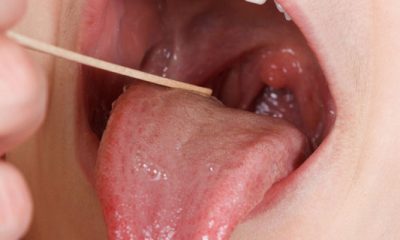News
The Nexus Between Sexual Violence And Drug Abuse

A 10-minute presentation by Mr Femi Babafemi, Director, Media & Advocacy, NDLEA, training workshop on “Leadership and Gender-Responsive Reporting of Sexual Violence in Nigeria” for journalists representing traditional and new media organisations, organised by Baobab For Women’s Human Rights on March 5, 2022.
PROTOCOL
Thank you for this opportunity to have this discussion today, which I believe will further enhance the social awareness surrounding the twin issues of SEXUAL VIOLENCE and DRUG ABUSE.
Quite a lot of people in our society are still ignorant of the dynamics of how sexual violence and drug abuse are intricately linked, principally because the subject matter is hardly a public discourse, which is ironic for something pervasive in society, something that negatively affects a large number of people, who are overwhelmingly women, both old and young.
It is then important that we avail ourselves of every opportunity to discuss these issues, not only to enrich our knowledge as individuals or professionals but to motivate us to push for a paradigm change in the public’s consciousness and social policies.
In that vein, my discussion is not about hypothetical situations but real-life, everyday experience and empirical findings from years of research.
Let me start by saying that the relationship between substance abuse and sexual violence goes both ways.
That is to say, on the one hand, people who abuse illicit substances are at a higher risk to become victims of sexual violence and on the other hand, people who are not drug users are more likely to abuse illicit substances after experiencing sexual violence.
Drug abuse is not an ambiguous term. It is “the habitual taking of illegal drugs.” Similalry, sexual violence is a term that is easily understood as “any sexual act or attempt to obtain a sexual act by violence or coercion (or) acts to traffic a person or acts directed against a person’s sexuality, regardless of the relationship to the victim.” When we talk about sexual violence, we are talking of rape, in all its manifestations and ramifications.
Now, the connection between both: While sexual violence can happen to anyone and in various circumstances, certain risk factors and vulnerabilities can increase the likelihood of it happening to anyone. One of these factors is the use and abuse of alcohol or illicit drugs.
The typical sexual violence scenario involved the use of force by the rapist against the victim. But a far greater number of sexual violence happens without the use of force.
How? The victims, typically teenagers or adults, were intoxicated or had their drinks “doped” at the time of the assault, and therefore incapacitated, unable to resist, and violated without consent.
This is how substance abuse and sexual violation intersect, WITH REGARD TO VICTIMS. Over the years, a lot of research, including police investigations of rape allegations, showed that the abuse of alcohol and drug contribute to victims’ vulnerability.
In my years as an editor, I have worked on stories of different shades of sexual crimes. The narrative of the use of “date-rape” drugs or party drugs or any type of psychoactive drug is a constant in most sexual violence crimes.
These are substances that made it easier for assailants to sexually assault another person. Essentially, the modus operandi is to spike or dope the victim’s drink and render her incapacitated, unable to resist being raped. In most instances, the victim’s memory is blurred such that she has no recollection of the crime.
Several drugs, which I will not mention on-air, are specifically used for that purpose, to knock the victim into a deep sleep, so that when she wakes up, hours later, she usually does not have a clear memory of how she ended up where and the state in which she found herself, nor a clear recollection of what happened in the intervening period.
And even when victims are fully awake during the violation of their bodies, they could hardly resist because they are weakened and robbed of coordination of their limbs by the drug in their bloodstream.
A lot of young and adult women had gone through this hell and are living with the trauma. The scenario is common with young ladies whose so-called male friends got them drunk on purpose to lower or completely take away their resistance and then have their way with them. Let me reiterate that alcohol is a drug, it is a depressant drug.
If you are a woman on a date with a male friend or among people who are not your family members, you have to be careful of what alcoholic drink you consume and how much of it you consume, and also always bear in mind that, the more alcohol that gets into your system, the greater the chances of you becoming a victim of sexual violence.
It has been verified by research that “approximately one-half of all sexual assault victims report that they were drinking alcohol at the time of their assault.”
I am not talking about whether substance use causes the assailant or not to commit sexual violence, that is a different thing entirely; rather my focus is on the victim, and the key point here is that perpetrators will not hesitate to use psychoactive substances to incapacitate their victims to facilitate sexual assault.
And their chances of doing that is greater if they perceive the target victims as vulnerable to the use and effect of the substance.
For instance, if a lady is known to be an alcoholic, she could be manipulated to get her drunk to the point where the assailant can have carnal knowledge of her, or even get her doped as long as she can accept drinks from him.
This situation becomes even more dangerous for the female target if she is already a known drug user, say, a user of psychoactive substances such as cannabis, as shown by another research finding which indicated that teenagers with drug problems are 18-21 times more likely to be sexually abused. The same thing applies to an adult too.
Some journalists who have worked on rape stories often had that candid moment with victims whereby they speak off record abou the facts of their ordeal, such as “He gave me a drink,” or “What I remembered last was that I was drinking” or “It was after I took that drink that I began to feel unwell…”
There are also incidences of women who MADE THEMSELVES VICTIMS because they abused drugs. While I would not want to be specific on this, I will use one as an example, that is the case of a female Lagos celebrity who went clubbing, got drunk, and only managed to order a ride home using a cab-hailing app (name withheld) at late hours in the night.
Obviously, she collapsed in the cab and woke up hours later to find herself violated.
The driver seeing her in that condition, had parked in the middle of nowhere, had sex with her and dumped her close to her home address. So as long as we are creating this awareness about sexual violence in society, we must educate women on how to avoid getting into positions or circumstances that put them at risk.
As I said earlier, the relationship between sexual violence and drug abuse goes both ways. The other side is that victims of sexual violence are likely to resort to the use of drugs (especially alcohol) to cope with the aftermath of the assault.
Violating someone’s body leaves a lot of victims with Post-Traumatic Stress Disorder (PTSD) and no matter how hard they try, it is usually nearly impossible to put the experience behind them.
They would have to handle the aftermath of shock, flashbacks, intense emotions, and painful memories. And don’t forget that we live in a society where victims of rape are stigmatised.
Even where the crime is not known to a third party, the victim herself is conditioned to subject herself to self-recrimination. You know, someone has been violated, and on top of that, because of the negative social construct of rape, she is preconditioned to relapse into shame and self-blame.
And where does that lead her? A private hell. In most instances, she’d try to find a way to deal with the trauma. Ultimately, she may turn to psychoactive substances to shut out the emotional torment she is going through.
Either by experimenting on her own, or on the advice of someone, she will invariably find reprieve in the use of psychoactive substances, which could be cannabis, cocaine, or even opioids like tramadol and Codeine.
And here, I will quote some research findings: “Rape victims are 3.4 times more likely to use marijuana, 5.3 times more likely to use prescription drugs for non-medicinal purposes, 6.4 times more likely to use cocaine, and 10 times more likely to use hard drugs other than cocaine.”
This fact is evident in the “post-rape substance abuse habits” of victims of sexual violence who were not using illicit substances before the assault.
I will cite some research findings that support this:
One: “abuse victims reported initiating substance use earlier than their non-abused peers.”
Two: “Women (and even men) who experienced childhood sexual abuse are more at risk for substance abuse issues later in life.”
Three: “Nearly 90% of alcoholic women were sexually abused as children or suffered severe violence at the hands of the parent.”
Sexual violence, or, to rephrase simply, sexually abusing a human being can leave the victim psychologically damaged over her lifetime, especially if she didn’t get the benefit of the care needed to heal her mind. It doesn’t matter whether, the abuse happened in her childhood, teenage years or when she was a fully grown adult.
This is where we all need to work more. We have a lot of women carrying these private stories of sexual violence in their minds and probably using alcohol or some drugs to help them deal with the trauma. The key to effective treatment is a thorough professional evaluation and the development of an individualized treatment plan to deal with both issues, not just one.
That is why in the standard rehabilitation procedure for drug users, counsellors and caregivers deal with every component of the addiction, including both the manifest and the latent factors which can likely trigger a relapse.
The key point is this: young and adult women have to be aware that the use of psychoactive substances, starting with alcohol to cannabis to pharmaceutical opioids like Codeine and tramadol and stimulants like cocaine, heroin and methamphetamine, make them easy prey to sexual assault; secondly, victims of sexual abuse, need to seek proper and comprehensive care and rehabilitation otherwise, there is a high probability they could end up abusing drugs.
Thank you all for listening
News
Nigeria is not mature for state police, says IGP

Kayode Egbetokun, inspector-general of police, says Nigeria is not “mature” for state police.
Egbetokun spoke on Monday at a national dialogue on state police organised by the house of representatives in Abuja.
The theme of the dialogue is ‘Pathways to Peace: Reimagining Policing in Nigeria’.
Represented by Ben Okolo, an assistant inspector-general of police, Egbetokun said Nigeria is not ready for a decentralised police force.
“It is the submission of the leadership of the Nigeria police force that Nigeria is yet to mature and ready for the establishment of state-controlled police,” he said.
There have been renewed calls for the establishment of state police following an uptick in kidnappings, banditry and violent attacks across the country.
On February 15, the federal government set up a committee to explore the creation of state police, amid the spate of insecurity in the country.
On February 20, a bill to establish state police passed second reading at the house of representatives.
The IGP said rather than create state police, the challenges mitigating against effective policing in Nigeria should be addressed.
He listed some of the challenges as inadequate manpower, inadequate operational equipment such as vehicles, arms and ammunition, communication equipment, drones, aerial surveillance cameras, security surveillance helicopters, armoured vehicles, and inadequate training of personnel,
He said these challenges have impacted negatively on the performance of police personnel.
He also said state police is open to abuse from powerful state governors.
“Then there is the potential for abuse of power by the state political leadership. State governors could use the police forces under their control for political or personal gain and compromise human rights and security,” he said.
“There would also be a conflict of jurisdiction.”
‘NSCDC SHOULD BE A DEPARTMENT IN THE POLICE’
Egbetokun proposed that the Nigeria Security and Civil Defence Corps (NSCDC) and the Federal Road Safety Corps (FRSC) should merge to become a department in the police.
“In view of this, the police leadership rather is recommending the following instead of creating state police,” he said.
“First, the Nigeria Security and Civil Defence Corps, Federal Road Safety to form a department under the Nigerian police.”
He said the recruitment of police personnel into the force should be increased by at least 30,000 annually to meet the United Nations minimum policing standard.
Egbetokun’s stance contrasted with that of Ibrahim Gaidam, minister of police affairs, who backed the establishment of state police.
Gaidam, who spoke at the event, said a more decentralised police force will help tackle the spate of insecurity in the country.
News
Kwara state government shuts abattoir over sale of poisoned beef

The Kwara state government has temporarily shut the abattoir at Mandate market in Ilorin.
The move follows reports of the sale of meat from 33 cows reportedly killed due to poisoning.
The Kwara Monitoring Group (KMG) made the claim in a statement on Sunday and called for immediate action from the state government.
“Over 33 cows were suspected to be poisoned and died immediately but surprisingly, the dead animals were slaughtered and distributed to butchers to be sold,” the statement reads.
“It happened along Atere Road (that leads to Al Hikma Campus) right inside the College of Arabic and Islamic Studies, Ilorin.
“It is our prayer that the concerned ministry and agency will take immediate action as nobody knows whose family will end up buying and consuming such poisoned meat being sold in the market.”
Responding to the report, the state government, in a statement signed by Amina El-Imam, commissioner for health, said a team of officials had been deployed to the market, adding that the suspected poisonous beef was seized.
“Kwara State Government officials and experts have arrived at the Mandate Market in Ilorin to activate measures to protect the public amid rumours of poisoned cow meat,” the statement reads.
“On the team were the Commissioner for Agriculture and Rural Development, Toyosi Thomas-Adebayo; Commissioner for Health, Dr. Amina Ahmed El-Imam; officials from the Ministry of Environment, including the Executive Secretary of the Kwara State Environmental Protection Agency, Mrs Folorunsho Idayat, and officials from the Ministry of Health, including the Permanent Secretary, Alhaja Afusat Ibrahim, and the Director of Public Health, Dr. Oluwatosin Fakayode, among others.
“The government has immediately confiscated all the suspected meats for laboratory tests and confirmation of claims after initial engagements with the Mandate Market stakeholders.
“The government urges members of the public to be calm while the team establishes the truth of the rumour of poisoned meat. It also commends the leadership of the market for their cooperation so far.”
In an updated statement, the Kwara government said the ministry of environment has temporarily shut the abattoir “to allow for fumigation and general cleaning of the area following suspected meat poisoning in the facility”.
“Dr. Abubakar Ayinla, permanent secretary of the ministry, said the steps are part of the efforts to protect members of the public following the incident,” the statement reads.
“The abattoir will be reopened on Wednesday.”
News
Ganduje used BDCs to change state funds to dollars, says Kano anti-graft agency

Muhuyi Magaji, chairman of the Kano state Public Complaints and Anti-Corruption Commission (PCCAC), says the agency has traced N51.3 billion allegedly diverted by Abdullahi Ganduje, former governor of the state.
Magaji spoke during an interview on Arise TV. He said the funds traced by the anti-corruption commission were half of the over N100 billion meant for LGs in the state.
“The monies were channelled to different local government accounts. They then met with local government staff to create false expenditure with a payment voucher and then diverted the money through a third party,” he said.
“We traced a lot of the diverted funds to various individual accounts at the single market and subsequently took the money in cash to the state government house with someone stationed with a counting machine.
“After that, they changed it to dollars and then took it to certain individuals. We have a bureau de change who will testify that money was sent to him and how it was changed to dollars.
“We have been able to trace over N51.3 billion based on confessional statements and how they were diverted. What we are tracking is well over N100 billion.”
The Kano anti-graft chair added that about 200 people confessed to how the Ganduje-led administration directed them to pad up their expenditure.
“About 200 people confessed to the commission that they took this money and ‘this money that they asked us to write, we purchased a car for hospital, we purchased antigenic drugs…’ it’s all lies.
“We had it and we didn’t even see the money. We only produced the premium. But the cashier confessed to the commission that this money, we have taken it to so-and-so person and that person was invited by the commission.
“He equally confessed that, yes, this person take it to so-and-so. So this is one. We established N51.3 billion.
“So as I’m talking to you now, we have a cogent and verifiable evidence that we are taking to court on this case.”
Magaji also alleged that Ganduje sold a company belonging to the state government at a ridiculous price to the first family of the state.
“The spouse of the former governor, she used to be the secretary of all the accounts that were linked in such particular allegations and the allegations is not all about this 51 billion. Because this 51, as I’m telling you, is virtually, I think it’s 90 percent of it was taken in cash. It’s only been traced. But it was taken in cash,” he added.
“But this one, it is on a particular issue. Whereby, you know, a company belonging to Kano government was sold to a company that belonged to the first family and this first family, all these people you mentioned, they were directors and that, including the person that you just mentioned, visited me in the office and at the same time, the spouse, I mean the wife of the former governor, is the secretary of that account and that company is a cotton ginnery that deals with the ginnery of cotton.
“We have cotton ginnery, we have cotton tannery. All the two companies were sold. But this particular one was sold to his family and under his hand, at the stupid price of, ridiculous price, forgive me, of N320 million. Instead of the bono of the property, which was N2 billion.
“So you see, and even the said N320 million was not remitted. It was only, we were only able to trace. We traced 90 million naira and this 90 million naira, we traced it back to this local government money.”
Magaji concluded that the ultimate goal of investigating Ganduje is to serve as a deterrent to others.
On April 18, Abdulazeez Ganduje, son of the former governor, visited the anti-graft agency to show support for the commission’s case against his dad, mum and brother.
In 2021, Abdulazeez dragged Hafsat Ganduje, his mother, to the Economic and Financial Crimes Commission (EFCC) over a bribery and land fraud case.
-

 Education1 week ago
Education1 week agoPrinting of JAMB slip: Beware of fake sites, police warn 2024 UTME candidates
-

 Entertainment6 days ago
Entertainment6 days agoJUST IN: Cubana Chief Priest pleads not guilty to naira abuse charge
-

 Business7 days ago
Business7 days agoX will start charging new users to post, says Elon Musk
-

 Entertainment6 days ago
Entertainment6 days agoCubana Chief Priest arrives court for naira abuse trial
-

 Health1 week ago
Health1 week agoFive benefits of drinking Okra water
-

 Celebrities6 days ago
Celebrities6 days ago‘Not see you for 6 months, impossible’ — Davido reacts to Cubana Chief Priest’s bail
-

 Business4 days ago
Business4 days agoElon Musk threatens to suspend X accounts doing engagement farming
-

 Health1 week ago
Health1 week agoSymptoms, risk factors, treatment — what to know about throat cancer


















